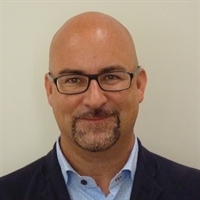 Vitor A.P. Martins dos Santos
Vitor A.P. Martins dos Santos
CEO LifeGlimmer GmbH & Professor Systems & Synthetic Biology, Head of Department, Wageningen University & Research, The Netherlands
LifeGlimmer GmbH, Berlin Germany & Deparment of Systems & Synthetic Biology, Wageningen University & Research, The Netherlands
Monday 23rd November 2020 14.45 CET
Computational Methods and Decision Support in Systems Medicine: case study necrotizing soft tissue infections
Abstract:
Necrotizing soft tissue infections (NSTI) are multifactorial and characterized by dysfunctional, time dependent, highly varying hyper- to hypo-inflammatory host responses contributing to disease severity. Furthermore, host-pathogen interactions are diverse and difficult to identify and characterize, due to the many different disease endotypes. There is a need for both refined bedside diagnostics as well as novel targeted treatment options to improve outcome in NSTI. In order to achieve clinically relevant results and to guide preclinical and clinical research the vast amount of fragmented clinical and experimental datasets, which often include omics data at different levels (transcriptomics, proteomics, metabolomics, etc..), need to be organized, harmonized and integrated and analyzed taking into account the Big Data nature of th ese data sets. In this chapter, we address these matters from a systems perspective and yet personalized approach. I will provide an overview on the increasingly more frequent use of Big Data and Artificial Intelligence (AI) to aggregate and generate knowledge from burgeoning clinical and biochemical information, address the challenges to manage this information and summarize current efforts to develop robust computer-aided clinical decision support systems so to tackle the serious challenges in NSTI diagnosis, stratification and optimized tailored therapy.
Key reference:
- Martins Dos Santos, Hardt C , Skrede S, Saccenti E. Systems and Precision Medicine in Necrotizing Soft Tissue Infections. 2020. Adv Exp Med Biol. 2020;1294:187-207.
- Bergsten H, Madsen MB, Bergey F, Hyldegaard O, Skrede S, Arnell P, Oppegaard O, Itzek A, Perner A, Svensson M, Norrby-Teglund A; INFECT study group. Correlation between immunoglobulin dose administered and plasma neutralization of streptococcal superantigens in patients with necrotizing soft tissue infections. Clin Infect Dis. 2020 Jan 9:ciaa022. doi: 10.1093/cid/ciaa022.
- Madsen MB, Skrede S, Perner A, Arnell P, Nekludov M, Bruun T, Karlsson Y, Hansen MB, Polzik P, Hedetoft M, Rosén A, Saccenti E, Bergey F, Martins Dos Santos VAP; INFECT study group, Norrby-Teglund A, Hyldegaard O. Patient’s characteristics and outcomes in necrotising soft-tissue infections: results from a Scandinavian, multicentre, prospective cohort study. Intensive Care Med. 2019 Sep;45(9):1241-1251. doi: 10.1007/s00134-019-05730-x.
Biography:
Prof. Dr. Ir. Vítor Martins dos Santos is the founder and CEO of Lifeglimmer GmbH, a Berlin-Based data analytics company providing advanced solutions to complex problems in the biosciences. Lifeglimmer a systems level approach we help elucidate mechanisms to understand cellular processes in different organisms, and translate this knowledge into applications of biotechnological, medical and environmental interest.
He also holds the Chair for Systems and Synthetic Biology at the Wageningen University, The Netherlands, is the Director of the Wageningen Centre for Systems Biology and former President of the Dutch Society of Biotechnology. He graduated in food engineering at the college of biotechnology, Oporto, Portugal and earned a doctorate on environmental bioprocess engineering at the Wageningen University & Research, the Netherlands. He did a post-doc at the Dept. of molecular biology of the Spanish Scientific Research Council (CSIC) in Granada, Spain and moved subsequently to the division of microbiology of the National Centre for Biotechnology Research (GBF), now named Helmholtz Centre for Infection Research in Braunschweig, Germany, where he has built the Systems and Synthetic Biology research group and runs several national and European multidisciplinary projects on the understanding and exploitation of microbial behaviour for a range of biotechnological endeavours. He is co-founder of two SME, published widely and holds several patents. He has coordinated and participated in numerous national and international projects in Systems & Synthetic Biology ad Systems Medicine, and has been involved in the dissemination, advise in science and governance policies. A major thrust of his research is the use of systems-level approaches to elucidate mechanisms to understand cellular processes in different organisms, and translate this knowledge into applications of biotechnological, medical and environmental interest.

